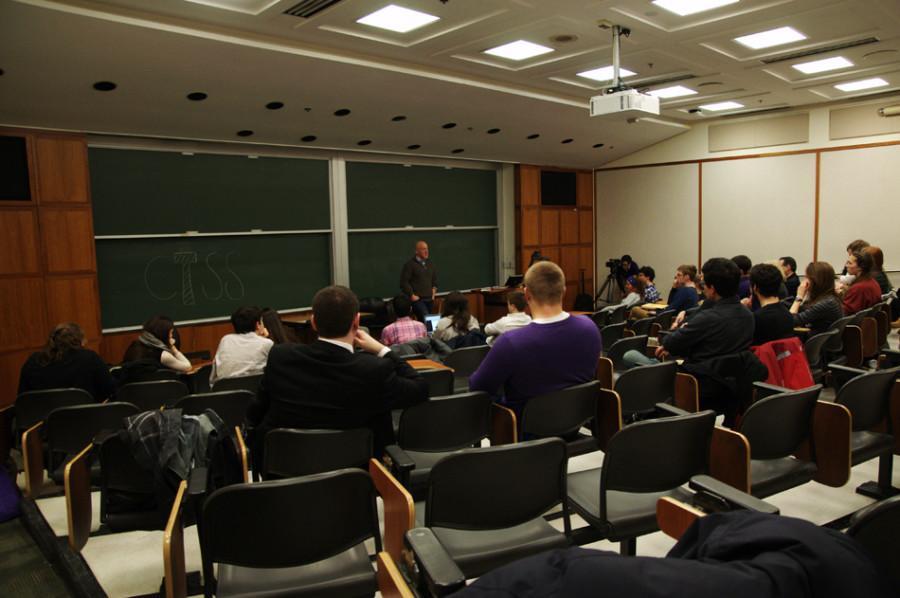New York Times Magazine’s Mark Leibovich talks Washington reporting
Sophie Mann/The Daily Northwestern
Chief national correspondent for The New York Times Magazine Mark Leibovich speaks to students, faculty and community members about politics and journalism. He discussed his career Thursday in Annenberg Hall.
January 15, 2015
Mark Leibovich, chief national correspondent for The New York Times Magazine and best-selling author spoke Thursday night as part of Northwestern’s Contemporary Thought Speaker Series.
Leibovich, who lives and reports in Washington, D.C., discussed his experiences reporting about politicians’ public lives in the nation’s capital.
“When you’re dealing with politicians, they are most likely to be closest to their communications people, their press people, their image-making, ad-making types,” he said. “More so — usually, not always — than their policy people.”
Leibovich is the author of “This Town” and “Citizens of the Green Room.”
He told to the audience of about 50 in Annenberg Hall about interviewing key political personalities like Hillary Clinton, John McCain and Mitt Romney.
“I was thinking about how to make this discussion more timely and my thoughts immediately jumped to Mitt Romney,” Leibovich said. “This is a weird situation. I had a story on him in September that was driven in part by this era of good feelings that was oddly bubbling up around him.”
Leibovich shared comical and serious anecdotes of his interviews with the presidential runner-up for the September article, in which Romney neither confirmed nor rejected the rumor that he was going to run for the presidential office for a third time.
He also talked about how Romney asked to have every part of the conversation recorded, in order to remind him that everything he says is on record, emphasizing how important public presentation is for powerful Washington leaders.
According to Leibovich, Greg Whiteley’s Netflix documentary “Mitt” is a fair representation of the double life political figures must lead in order to face both the public and their personal circle.
“(The documentary) got me thinking about the dichotomy between the public life that we see and the public figures as they really exist,” he said. “That goes to one of the essential gaps between how people really are and how they want to be perceived. That is sort of the gap that we as journalists live in.”
Leibovich also shared anecdotes of the times he asked what Clinton and McCain consider their least favorite state.
Clinton said she loved them all. McCain said he “would really hate to live in Milwaukee.”
“I remember saying, ‘Well, that’s not a state,’” Leibovich said to a laughing audience.
Leibovich was writing a story for The Washington Post about McCain. When he realized he had some space to fill, he decided to add McCain facts. One of them was his dislike for Milwaukee.
“I thought nothing (about it) and I’m sure he thought nothing about it… Until he ran for president in 2008 and Wisconsin was a swing state,” Leibovich said.
Leibovich then understood why Clinton didn’t pick favorites.
Joe Eichenbaum, Contemporary Thought Speaker Series chairman, said his group decided to invite Leibovich because it was looking for a speaker with a very contemporary take on a major issue.
“He’s really great at talking about Washington today,” the Weinberg senior said. “He touched on everything we wanted to hear about.”
Jonathan Cohen, a Weinberg senior who was at the event, said he enjoyed Leibovich’s stories.
“It really put into focus how politicians are trying to create (a) persona,” he said.
In an interview with The Daily, Leibovich spoke about overcoming the fear of interviewing Washington’s “big guys.”
“I used to be a lot more nervous than I am,” he said. “One thing that reporters should keep in mind when they get nervous is that these people need you as much as you need them. You have great power having a notebook, having a tape recorder. You shouldn’t forget that. It’s your story, you’re in control.”
Email: [email protected]
Twitter: @marianaa_alfaro


